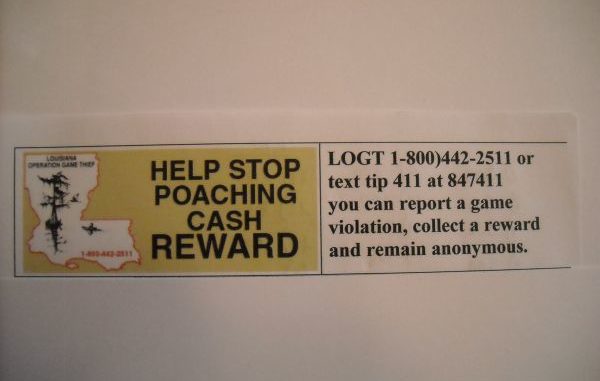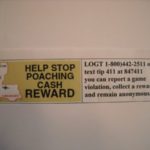
A game warden’s best friend
Members of Louisiana Operation Game Thief Inc. held their annual meeting on Jan. 26 at LDWF Headquarters in Baton Rouge. LOGT is now 28 years old and continues to do what it has done since 1984 — pay cash rewards for information leading to the apprehension of wildlife offenders.
In the late ’70s and early ’80s, western states (beginning with New Mexico) began establishing cash-reward programs focusing on wildlife resource offenses. The programs functioned just like the more-readily recognized urban Crime Stoppers, and caught on rapidly across the country.
Louisiana’s OGT was up and running by 1984, and has raised funds and paid rewards without fail ever since.
The LOGT reward process isn’t complicated. Anyone providing information and/or assistance to wildlife enforcement leading to the apprehension of an alleged violator is eligible for a cash reward provided by LOGT.
How that happens can be very interesting sometimes. In a surprising number of cases, the reward is not always the primary motivator for turning in an offender.
The general consensus among experienced game wardens is that people turn in other people for one of three reasons.
For many it is a genuine concern for the resource, particularly where threatened or endangered species are concerned. Others have a personal interest in protecting wildlife on their own land or hunting lease. And then there is the mother of all incentives: revenge.
Early on in my own career, I discovered that in a surprising number of cases, people provided informant for purposes of evening the score. Ex-wives and girlfriends often provide a wealth of accurate information about the poaching habits of former husbands and boyfriends. “Hell hath no fury like a woman scorned.” You better believe it.
In other situations, the slightest injury to manly or family pride will make the offended party tell the game warden all about someone’s bad habits.
Reward money is often just icing on the cake in these situations.
But whether cash reward is the primary reason for providing violator information or not, it can’t hurt. It is also small compensation to anyone placed at risk by informing on potentially violent individuals.
The private citizens who make up the membership, board of directors and officers of LOGT understand that. They believe that by providing cash rewards they have a very direct positive impact on fish and wildlife protection — a belief shared by wildlife agents.
So just how much may an informant receive in reward funds from LOGT? In the original bylaws, LOGT’s founding members established minimum and maximum rewards of $100 and $1,000, respectively. Cases involving deer, turkey, alligators, migratory birds and federally protected species merit a minimum of $300.
Matching rewards in equal or higher amounts are available for some species. For example, the Louisiana Chapter of the National Wild Turkey Federation provides a reward in equal amount on any case in which LOGT pays out. So turkey-case informants receive a minimum of $600.
LOGT consistently pays substantial amounts in reward money year after year, and 2012 was no exception. At the January meeting, the board of directors approved rewards in 24 cases resulting from informant information during the fall and winter hunting seasons. The rewards totaled $9,200, bringing total reward payouts to $22,100 for the year.
In 2012 LOGT reviewed 53 cases involving deer, migratory birds, alligators, turkey, small game, non-game animals, and both freshwater and saltwater fish.
Fund raising is never easy for any organization, and LOGT is no exception. Members and supporters initially raised reward funds by selling raffle tickets and soliciting donations. Generous donations from a variety of conservation organizations and private companies have also sustained LOGT reward funds over the past 28 years.
More innovative funding sources have evolved in recent years, originating in the federal and state judicial district courts. In some cases U. S. magistrates and judicial district court judges have, in addition to fines, ordered convicted offenders to serve terms of probation with conditions requiring them to donate to LOGT. Judicial district and U. S. attorneys have entered into plea agreements with offenders with stipulations requiring donations to LOGT. The concept of violators footing the bill is widely supported in the courts.
Over time, many more people have become aware of the reward program. As a result, more rewards are paid annually and funds going out are surpassing those coming in. LOGT officers and board members are currently discussing new ways to generate funds.
Donations are tax deductible, and can be sent to Louisiana Operation Game Thief, Inc., c/o Louisiana Department of Wildlife & Fisheries, P. O. Box 98000, Baton Rouge, LA 70898.
LOGT meets quarterly either at LDWF Headquarters in Baton Rouge or at other agency facilities more centrally located in the state.
And, according to current LOGT President Ray Bordelon, the one thing needed more than additional funds is public participation.
“We have a very dedicated but small group,” said Bordelon. “We sure could use more members, and we welcome anyone interested in participating.”
Contact Ray Bordelon at avoywlf@hotmail.com for meeting dates and locations and any additional information.
LOGT rewards are valuable tools utilized by wildlife enforcement agents. This long-standing organization has earned its place among the most effective conservation organizations and is worthy of support from every Louisiana sportsman.




